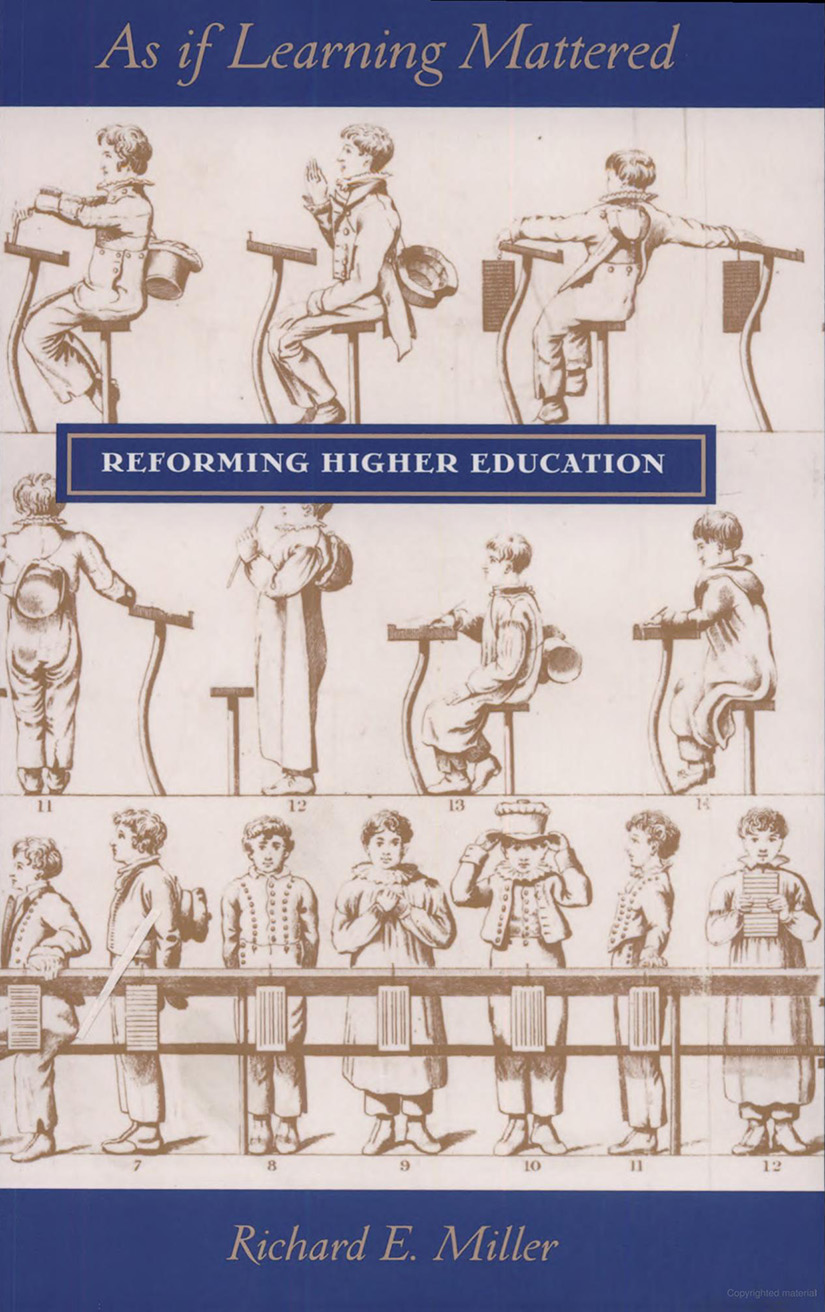As If Learning Mattered: Reforming Higher Education
By Richard E. Miller
 Published in 1998, when the culture wars had reached the end of their second decade, Richard E. Miller’s As If Learning Mattered explored why higher education has been particularly resistant to reform. Unraveling stereotypes about conservative, liberal, and radical reform efforts, Miller looked at what actually happened when theories about education were put into practice. As If Learning Matters raises critical questions: What did Matthew Arnold do as a school inspector to promote the study of “the best that has been thought and said in our time”? Why did the Great Books program fail at the University of Chicago and succeed at a small liberal arts college in Annapolis, Maryland? How did Tony Bennett and others involved in the radical work of British Cultural Studies test their students’ knowledge of popular culture? How did ethnographers of schooling respond when they encountered students with apparently racist attitudes?
Published in 1998, when the culture wars had reached the end of their second decade, Richard E. Miller’s As If Learning Mattered explored why higher education has been particularly resistant to reform. Unraveling stereotypes about conservative, liberal, and radical reform efforts, Miller looked at what actually happened when theories about education were put into practice. As If Learning Matters raises critical questions: What did Matthew Arnold do as a school inspector to promote the study of “the best that has been thought and said in our time”? Why did the Great Books program fail at the University of Chicago and succeed at a small liberal arts college in Annapolis, Maryland? How did Tony Bennett and others involved in the radical work of British Cultural Studies test their students’ knowledge of popular culture? How did ethnographers of schooling respond when they encountered students with apparently racist attitudes?
By grappling with such questions, As If Learning Mattered focused attention on how students, teachers, and administrators experience life in the academy as they negotiate the daily realities of reading lists, writing assignments, grading practices, and funding crises. By juxtaposing what educators think about social change with what these same people actually do in the classroom, Miller successfully identified new ways to generate locally effective reform objectives for the university as it retools for the information age.
Reflection: Read Richard E. Miller's reflection on the 25th anniversary of the publication of As If Learning Mattered
Table of Contents
Chapter 1. Thinking with Students: Deliberations on the History of Educational Reform
Chapter 2. Ministering to a Mind Diseased: Matthew Arnold, Her Majesty’s Inspector
Chapter 3. “Education for Everybody”: Great Books and the Democratic Ideal
Chapter 5. Teaching Others: Ethnography and the Allure of Expertise
Chapter 6. The Stories That Teach Us
About the Author
Richard E. Miller is Professor of English at Rutgers. In addition to As if Learning Mattered, he is the author of the books On the End of Privacy: Learning to Read, Write, and Think in the 21st Century, Habits of the Creative Mind (with co-author Ann Jurecic), and Writing at the End of the World. He has delivered more than one hundred invited talks across the country and abroad on a range of topics related to literacy, technology, and higher education. Miller started his career as a writing teacher, spent time as an administrator, returned to the classroom as a teacher specializing in large Gen Ed lecture courses, and now focuses on teaching creative thinking and imaginative reading. In recognition of his success in these areas over the 29 years he has been teaching at Rutgers, he received the Chancellor-Provost’s Award for Excellence in Teaching in 2022, which honors a member of the New Brunswick faculty “whose teaching contributions resulted in an extraordinary impact on the institution, students’ experiences, and public engagement.” He is currently writing a work of creative nonfiction entitled, On Becoming a Writer.
Publication Information: Miller, Richard E. (2023). As if Learning Mattered: Reforming Higher Education. The WAC Clearinghouse. https://wac.colostate.edu/books/landmarks/miller/ (Originally published in 1998 by Cornell University Press)
Publication Date: August 15, 2023
Contact Information:
Richard E. Miller: rimiller@english.rutgers.edu
Landmark Publications in Writing Studies
Series Editor: Mike Palmquist, Colorado State University
![]() This book is available in whole and in part in Adobe's Portable Document Format (PDF).
This book is available in whole and in part in Adobe's Portable Document Format (PDF).
Copyright © Richard E. Miller. Republished with permission. You may view this book. You may print personal copies of this book. You may link to this page. You may not reproduce this book on another website. For permission to use materials from this book in other publications, please contact Richard E. Miller.